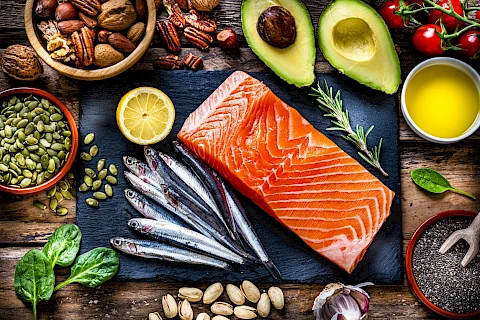
Seasonal Affective Disorder (SAD) is a form of depression that fluctuates with the time of year and often peaks during the spring months. The role of diet in managing this condition carries immense potential in boosting mood and overall well-being. Senior Helpers explains the power of senior nutrition management for SAD this springtime and shows how certain fares can help alleviate symptoms.
What is Seasonal Affective Disorder (SAD)?
Major depressive disorder with cyclic patterns is more than just the "winter blues." It is a type of apathy that follows the course of time. Manifestations often emerge in the fall and winter and taper off in the spring. A less common form of SAD, called "spring onset SAD," manifests during springtime and early summer. Its indications include insomnia, poor appetite, weight loss, agitation, and anxiety. This is particularly concerning for older adults, as diminished sunlight can disrupt body rhythms and lead to feelings of dysthymia and lethargy. Elderly loved ones who have limited mobility and little social interaction might see these feelings exacerbated.
Why Senior Nutrition Management for SAD Matters
Recent studies suggest that diet can significantly influence mental health. Certain foodstuffs containing essential vitamins and nutrients are known to uplift the spirits and overall well-being. They can have a positive impact on brain functions and can reduce negative feelings and anxiety.
Diet to Combat Spring Periodic Mood Disorder
To combat the condition, it is imperative to focus on getting the right sustenance for older adults with SAD. By incorporating specific foods into their diet, older retirees can support their mental well-being. Here are some of the most beneficial nutrients you may want to add to your next meal plan:
Vitamin D
Vitamin D, often called the "sunshine vitamin," helps to regulate temper. A deficiency in this fat-soluble vitamin is associated with an increase in symptoms of depressive episode. It is found in fatty fish, cheese, egg yolks, and fortified foods like milk and cereals.
Omega-3 Fatty Acids
Omega-3 fatty acids in fatty fish, flaxseeds, walnuts, and chia seeds, have improved brain health and stabilized one’s temper. Eating meals rich in omega-3 fatty acids improves blood flow to the brain and may increase memory.
B Vitamins
B vitamins, especially B12, and folate, are significant in producing brain chemicals that affect feelings and other brain functions. Food plans rich in B vitamins include lean meat, nuts, seeds, milk, and green leafy vegetables.
Magnesium
Magnesium, which is found in whole grains, nuts, seeds, and green leafy vegetables, helps maintain nerve and muscle function and supports a healthy immune system.
Antioxidants
Antioxidants in fruits and vegetables, such as berries and spinach, can help counteract harmful agents in the body, potentially lowering the risk of depression.
Practical Dietary Tips for Older Adults
Senior nutrition management for SAD means incorporating the emotionally uplifting ingredients mentioned above into a meal. Elderly loved ones with specific health conditions should consult with their healthcare providers and consider any dietary restrictions. Ensuring hydration into the daily routine can also help manage feelings of fatigue associated with SAD.
Senior Helpers Helps Boost Elderly’s Mood With Food
We offer comprehensive, in-home elderly care services designed to meet the individual needs of our community's golden-agers and their families. If you live in the Massapequa, Hicksville, Great Neck, or Nassau County areas, contact us at Senior Helpers Central Long Island. We are committed to supporting older adults' needs for proper sustenance and helping them live a healthier, happier life.